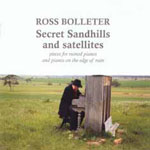Home » Jazz Articles » Album Review » Ross Bolleter: Secret Sandhills and Satellites
Ross Bolleter: Secret Sandhills and Satellites
In his extensive sleeve notes, Bolleter writes that a piano is Ruined (rather than Neglected or Devastated) when "it has been abandoned to all weathers and has become a decaying box of unpredictable dongs, clicks and deboomps, with not a single note (perhaps excepting D) sounding like one from an even-tempered upright piano. Sometimes you push down one key and five or six others companionably go down with it, making for a surprise cluster and swathes of harmonics singing forever. The notes that don't work... are at least as interesting as those that do.
At one time there were reportedly some 700,000 pianos in Australia, when the population was barely three million, so it is maybe unsurprising that there are so many ruined pianos to be found there. Bolleter's description makes it sound like they are everywhere in Australia—like dead cars or fridges elsewhere (certainly in London!).
The sound of these ruined pianos is often very close to that of a prepared piano, with their occasional unpredictable thuds and clangs. In a sense, they are prepared pianos, but the preparation has been natural (by the elements, flora and fauna), not man-made. When Bolleter includes real tracks of prepared piano, such as "Going to War Without the French Is Like Going to War Without an Accordion and "Time Waits (the latter studio-recorded on a prepared Yamaha Grand), they fit seamlessly into the flow of the album.
Bolleter certainly manages to extract the most from these ruined pianos, and he uses the results to produce music that is compelling and evocative. He frequently plays two instruments simultaneously, also supplementing the ruined pianos themselves with accordion, percussion and sound effects. By far the longest and most substantial piece here is "Secret Sandhills, at over 28 minutes. Unusually for music on Emanem (a bastion of improvised music), it is a constructed piece, the result of editing together Bolleter's playing on six different ruined pianos in six different locations, each with its own unique sound and idiosyncrasies. (Bolleter details some of the history of each one. For example, "Originally the bar piano from the Big Bell Hotel. Subsequently the Ruined Piano at Nallan Sheep Station, near Cue, 700 kms NE of Perth, Western Australia. Priceless stuff.) The end result is an entertaining and varied sound collage.
Highly recommended—not as a novelty, but as a unique listening experience.
Track Listing
Secret Sandhills (in memory of Timmy Payungka Tjapangati c1940-2000); Axis; Dead Marine (for David and Carol Kotlowy); And then I saw the wind
Personnel
Ross Bolleter: ruined pianos.
Album information
Title: Secret Sandhills And Satellites | Year Released: 2006 | Record Label: Emanem
< Previous
Isaac Hayes: Shaft
Next >
Bridge of Art
Comments
Tags
For the Love of Jazz
 All About Jazz has been a pillar of jazz since 1995, championing it as an art form and, more importantly, supporting the musicians who create it. Our enduring commitment has made "AAJ" one of the most culturally important websites of its kind, read by hundreds of thousands of fans, musicians and industry figures every month.
All About Jazz has been a pillar of jazz since 1995, championing it as an art form and, more importantly, supporting the musicians who create it. Our enduring commitment has made "AAJ" one of the most culturally important websites of its kind, read by hundreds of thousands of fans, musicians and industry figures every month.



















